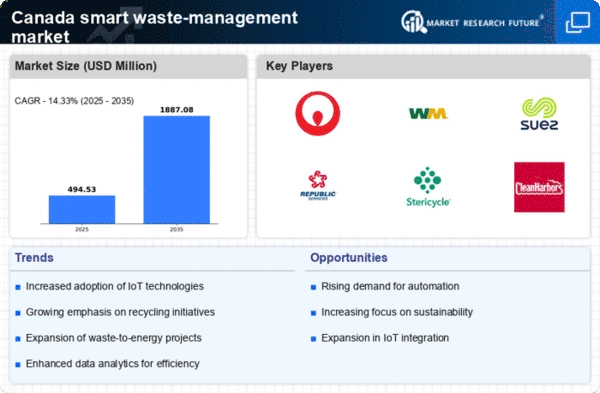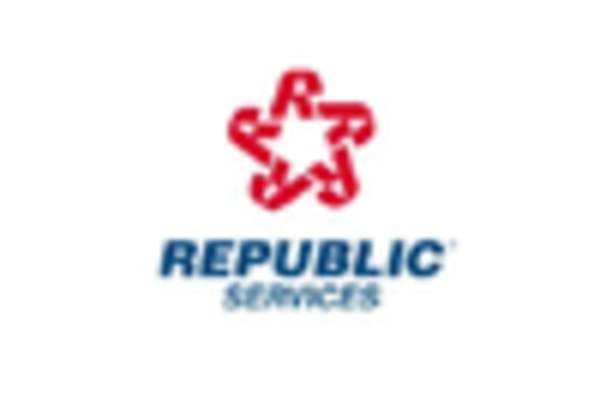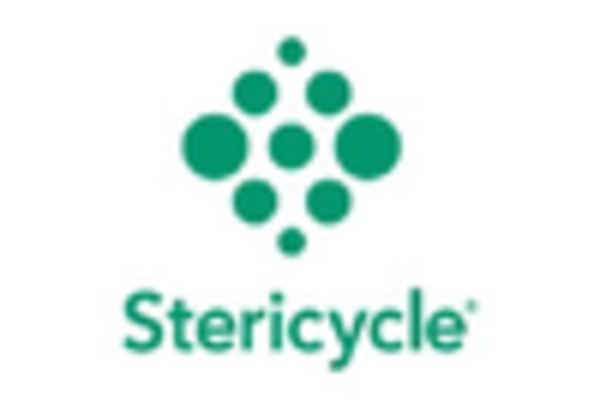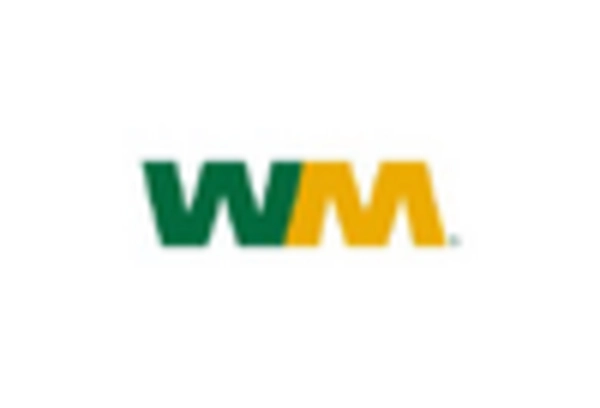Regulatory Support for Innovation
The smart waste-management market in Canada is experiencing a surge in regulatory support aimed at fostering innovation. Government policies are increasingly encouraging the adoption of advanced waste management technologies. For instance, the Canadian government has set ambitious targets for waste reduction, aiming for a 50% diversion rate by 2030. This regulatory framework not only incentivizes municipalities to invest in smart waste solutions but also promotes public-private partnerships. As a result, companies in the smart waste-management market are likely to benefit from grants and funding opportunities, which could enhance their research and development capabilities. Furthermore, compliance with evolving regulations may drive the demand for smart waste technologies, as municipalities seek to meet legal requirements while improving operational efficiency.
Urbanization and Population Growth
Urbanization in Canada is a significant driver for the smart waste-management market. As cities expand and populations increase, the volume of waste generated is also rising. Statistics indicate that urban areas account for approximately 80% of Canada's total waste generation. This trend necessitates the implementation of efficient waste management systems to handle the growing waste volumes. Smart waste-management solutions, such as IoT-enabled bins and automated collection systems, are becoming essential for municipalities to optimize their waste collection processes. The integration of technology in waste management not only enhances operational efficiency but also reduces costs associated with waste disposal. Consequently, the smart waste-management market is poised for growth as urban centers seek innovative solutions to manage their waste effectively.
Economic Incentives for Waste Reduction
Economic incentives play a crucial role in shaping the smart waste-management market in Canada. Municipalities are increasingly recognizing the financial benefits of adopting smart waste technologies. For example, implementing smart bins can lead to a reduction in collection costs by up to 30%, as they optimize collection routes based on real-time data. Additionally, the potential for revenue generation through recycling and composting initiatives is prompting local governments to invest in smart waste solutions. The Canadian government has also introduced various funding programs aimed at supporting municipalities in their transition to smarter waste management practices. These economic incentives not only encourage the adoption of innovative technologies but also contribute to the overall sustainability goals of communities across Canada.
Technological Integration in Waste Management
The integration of advanced technologies is a pivotal driver for the smart waste-management market in Canada. The adoption of technologies such as artificial intelligence, machine learning, and data analytics is transforming traditional waste management practices. These technologies enable municipalities to monitor waste levels in real-time, predict collection needs, and optimize routes for waste collection vehicles. Reports suggest that the use of smart technologies can lead to a reduction in greenhouse gas emissions by up to 20% in waste collection operations. As cities strive to enhance their environmental performance, the demand for smart waste-management solutions is likely to increase. This technological integration not only improves operational efficiency but also aligns with the broader sustainability objectives of Canadian municipalities.
Public-Private Partnerships in Waste Management
Public-private partnerships (PPPs) are emerging as a vital driver for the smart waste-management market in Canada. These collaborations between government entities and private companies facilitate the sharing of resources, expertise, and technology. By leveraging the strengths of both sectors, municipalities can implement innovative waste management solutions more effectively. For instance, partnerships can lead to the development of smart waste collection systems that utilize real-time data to enhance efficiency. Furthermore, PPPs can provide access to funding and investment opportunities, which are crucial for the deployment of advanced waste management technologies. As Canadian cities continue to seek sustainable waste management practices, the role of public-private partnerships is likely to expand, fostering innovation and improving service delivery in the smart waste-management market.
















